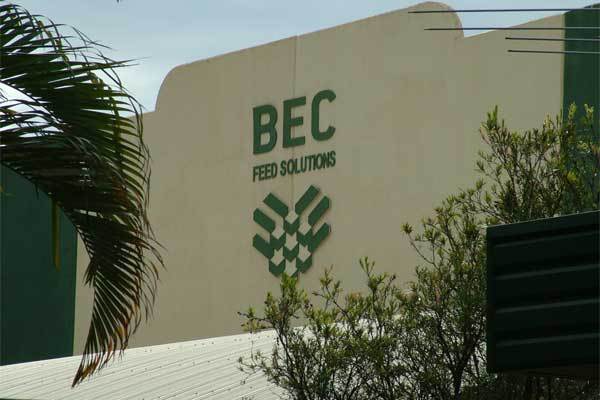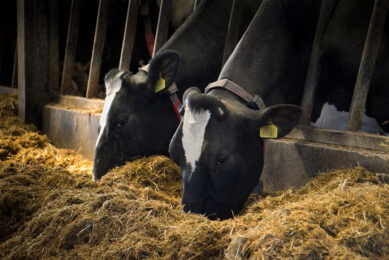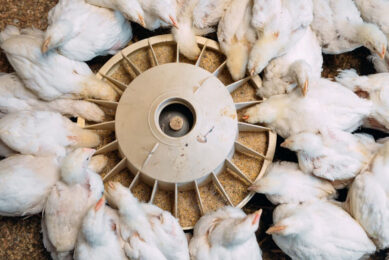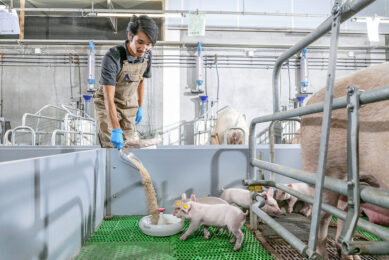BEC Feed Solutions, Australia

Modest growth is an acceptable trait according to Richard Reeder, founder and part owner of premix manufacturer BEC Feed Solutions in Carole Park, close to Brisbane in Queensland, Australia. His company prospers by its core values and only grows in amounts it can properly manage.
Brisbane Export Corporation (BEC) in 1985 commenced operations as a successful international exporter of rural commodities to countries throughout Europe and Asia. The manufacturing operation at Carole Park is equipped with process control and state-of-the-art concepts that further tightened its quality assurance and streamlined and automated traceability. “A key commitment to the feed industry,” says Richard Reeder, basic driver and initiator of these developments and still a current director. He expanded the company to its present size providing 57 full time jobs. “In 2007 we acquired the Adisseo Australia premix and feed additive facility in Carole Park and in 2009 we designated this site as a dedicated non-medicated site, the only major premixing facility in Australia with this feature,” Reeder explains. “There are no medications used or stored on this site and there is no medicated product exchanged between the sites. We can guarantee that non-medicated premixes contain no contamination of any medications.”
About the growth of the company he says: “We have grown in what we could bite, chew and swallow. To purchase the Adisseo plant was a good opportunity and fitted well with our strategy, but it was a challenge to merge the large corporate and the small business cultures, as well as the different processes and systems. We were finally able to manage it.”
Name change
In 2006 the company changed its name to BEC Feed Solutions to more parallel the nature of the business. Today it is one of the leading B2B and B2F manufacturers and suppliers of both branded and custom-made vitamin/mineral premixes and feed ingredients that are tailored to meet customer requirements. “We offer a full range of products to the feed industry, except grains. This includes nutrition advice, feed formulation, premixes, micro and macro ingredients, feed additives and proteins,” Reeder says. “Also, due to the Australian tyranny of distance, we need to have the whole palette, because you cannot afford going to a client with just a few products.” Almost everything is bagged except the proteins (eg. processed animal proteins), which are directly shipped in bulk from the manufacturer to the customer.
The Australian feed industry is relatively small. Depending on inclusion rate, the market for premixes is estimated at only 30,000 tonnes. Despite this, most global operating companies want a presence in it. Reeder finds it hard to understand how, if properly servicing the market, a small ‘presence’ can be profitable. He believes BEC is second in the premixing market after number one DSM Animal Nutrition. “We are also a leading provider of nutritional advice and agricultural commodities servicing most of Australia’s major poultry, dairy, pig and beef producers. The key is to supply customers what they want, on time and with a smile. Our two premix plants can facilitate that.”
Educate clients and staff
BEC Feed Solutions conducts two-day premix clinics four times per year for customers to better understand the importance of ‘blending’, particularly with the large number and variety of ingredients available today. The premix clinic provides methods to objectively evaluate quality, ease of use, mixability and stability of the products the clients purchase and to ensure the efficacy of their premix and feed. The practical sessions are carried out in small groups and useful information regarding products and premixes are provided during the clinic. Premix clinics have been conducted for many years in a dedicated laboratory at the company’s facility at Antimony Street in Carole Park. Next to that there is the training of staff to tighten control and ‘to ensure the right product is in the right bin’. This is important because with a large portfolio there are many suppliers, many ingredients, which exacerbates the potential for errors. “We do push quality,” says Brett Antonio, managing director at BEC. “Our traceability with a barcode system not only identifies the supplier of the ingredient, but also the manufacturer’s batch number of each ingredient.”
The Australian market is more or less following the European market, with alternatives to growth promoters. Demand is growing. Antonio not without pride recalls the development of BEC Calf Buddy, their latest product which was developed in cooperation with Lallemand Animal Nutrition. This live yeast product is to be used in young calves to stimulate rumen function. With a relatively small market it is difficult to carry out proper research. “Australia lacks volume to do large-scale research trials,” Antonio says. “The economies of scale are too low. We use the options available. We support the pig and poultry CRC (Cooperative Research Centres), but these have limited capacity. On a practical scale we carry out trials at a few contracted pig, poultry, beef and dairy farms.” The results assist BEC in driving their feed additive portfolio to provide customers with real added value.











